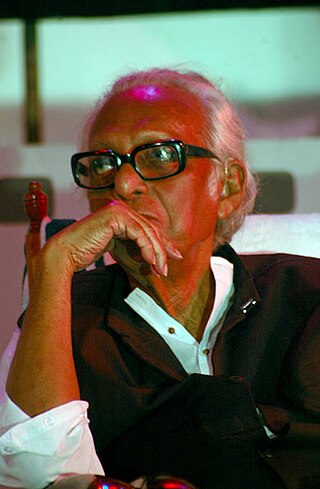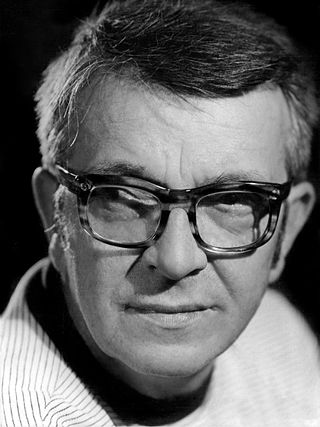
Mrinal Sen was an Indian film director, and screenwriter known for his work primarily in Bengali, and few Hindi and Telugu language films. Regarded as one of the finest Indian filmmakers, along with his contemporaries Satyajit Ray, Ritwik Ghatak, and Tapan Sinha, Sen played major role in the New Wave cinema of eastern India.

Miklós Jancsó was a Hungarian film director and screenwriter.

Márta Mészáros is a Hungarian screenwriter and film director. The daughter of László Mészáros, a sculptor, Mészáros began her career working in documentary film, having made 25 documentary shorts over the span of ten years. Her full-length directorial debut, Eltavozott nap/The Girl (1968), was the first Hungarian film to have been directed by a woman, and won the Special Prize of the Jury at the Valladolid International Film Festival.
Christian-Jaque was a French filmmaker. From 1954 to 1959, he was married to actress Martine Carol, who starred in several of his films, including Lucrèce Borgia (1953), Madame du Barry (1954), and Nana (1955).

Juan Antonio Bardem Muñoz was a Spanish film director and screen writer, born in Madrid. He was a member of the Communist Party. Bardem was best known for Muerte de un ciclista (1955) which won the FIPRESCI Prize at the 1955 Cannes Film Festival, and El puente (1977) which won the Golden Prize at the 10th Moscow International Film Festival. His 1979 film Seven Days in January won the Golden Prize at the 11th Moscow International Film Festival. In 1981 he was a member of the jury at the 12th Moscow International Film Festival. In 1993 he was a member of the jury at the 43rd Berlin International Film Festival. In 1953 he and Luis García Berlanga founded a film magazine, Objetivo, which existed until 1956. Bardem is the father of director Miguel Bardem and uncle of actor Javier Bardem. Bardem died in Madrid in 2002, at age 80.

The 28th Cannes Film Festival was held from 9 to 23 May 1975. The Palme d'Or went to the Chronique des Années de Braise by Mohammed Lakhdar-Hamina. In 1975, a new section, "Les Yeux fertiles", which was non-competitive, was introduced. This section, along with sections "L'Air du temps" and "Le Passé composé" of the next two years, were integrated into Un Certain Regard in 1978.

Manuel Gutiérrez Aragón is a Spanish screenwriter and film director. His 1973 film Habla, mudita was entered into the 23rd Berlin International Film Festival. In 1977, he won the Silver Bear for Best Director for Camada negra at the 27th Berlin International Film Festival. His 1979 film El corazón del bosque was entered into the 29th Berlin International Film Festival. Two years later, his film Maravillas was entered into the 31st Berlin International Film Festival. His 1982 film Demons in the Garden was entered into the 13th Moscow International Film Festival where it won the FIPRESCI Prize. In 1991 he was a member of the jury at the 17th Moscow International Film Festival.

Sophia Chiaureli, professionally known as Sofiko Chiaureli, was a Soviet Georgian actress. Thought to be the muse of filmmaker Sergei Parajanov, she played a significant role in the 20th century Georgian theater and was associated with the country's two most prominent theaters, the Rustaveli Theatre (1964–1968) and Marjanishvili Theatre.

Zoltán Fábri was a Hungarian film director and screenwriter. His films The Boys of Paul Street (1969) and Hungarians (1978) were nominated for the Academy Award for Best Foreign Language Film. His 1965 film Twenty Hours shared the Grand Prix with War and Peace at the 4th Moscow International Film Festival. His 1969 film The Toth Family was entered into the 7th Moscow International Film Festival. His 1975 film 141 Minutes from the Unfinished Sentence was entered into the 9th Moscow International Film Festival, where he won a Special Prize for Directing.
The Fifth Seal is a 1976 film by Hungarian director Zoltán Fábri based on the 1963 novel with the same name by Hungarian author Ferenc Sánta. It won the Golden Prize at the 10th Moscow International Film Festival and it was entered into the 27th Berlin International Film Festival. The film was also selected as the Hungarian entry for the Best Foreign Language Film at the 49th Academy Awards, but was not accepted as a nominee.
Christo Christov was a Bulgarian film director and screenwriter. He directed 19 films between 1969 and 1997.

Andrei Sergeyevich Smirnov is a Soviet and Russian actor and filmmaker who is known for directing the films Belorussian Station (1971), Autumn (1974) and A Frenchman (2019). He was a member of the jury at the 38th Berlin International Film Festival in 1988.
Father is a 1966 Hungarian drama film written and directed by István Szabó. The film is a coming of age story. The main character copes with his childhood loss of his father against the backdrop of the Hungarian Revolution of 1956 and memories of the earlier dictatorship of the Arrow Cross Party modelled on the German Nazi Party.
Gheorghe Vitanidis was a Romanian film director. He directed 19 films between 1958 and 1987. His 1969 film A Woman for a Season was entered into the 6th Moscow International Film Festival. His 1979 film The Moment was entered into the 11th Moscow International Film Festival.
Walls is a 1968 Hungarian drama film directed by András Kovács. It was entered into the 6th Moscow International Film Festival where it won a Diploma.
The Fortress is a 1979 Hungarian science fiction film directed by Miklós Szinetár. It was entered into the 11th Moscow International Film Festival.
The 15th Moscow International Film Festival was held from 6 to 17 July 1987. The Golden Prize was awarded to the Italian film Intervista directed by Federico Fellini.
Jesus Christ's Horoscope is a 1989 Hungarian drama film directed by Miklós Jancsó. It was entered into the 16th Moscow International Film Festival.
The 7th International Film Festival of India was held from 3–17 January 1979 in New Delhi. The festival opened with "Junoon" by Shyam Benegal in the out of Competition world premiere. The festival was the only competitive and exclusive international film festival organised in the entire Third World during 1978–79. For the first time in the history of the Indian Competitive film festivals, the Jury was headed by a foreigner, Qusmane Sembene of Senegal. There were two women on the jury for the first time.
Hungarian science fiction comprises books and films in the fiction genre produced all across Hungary.









